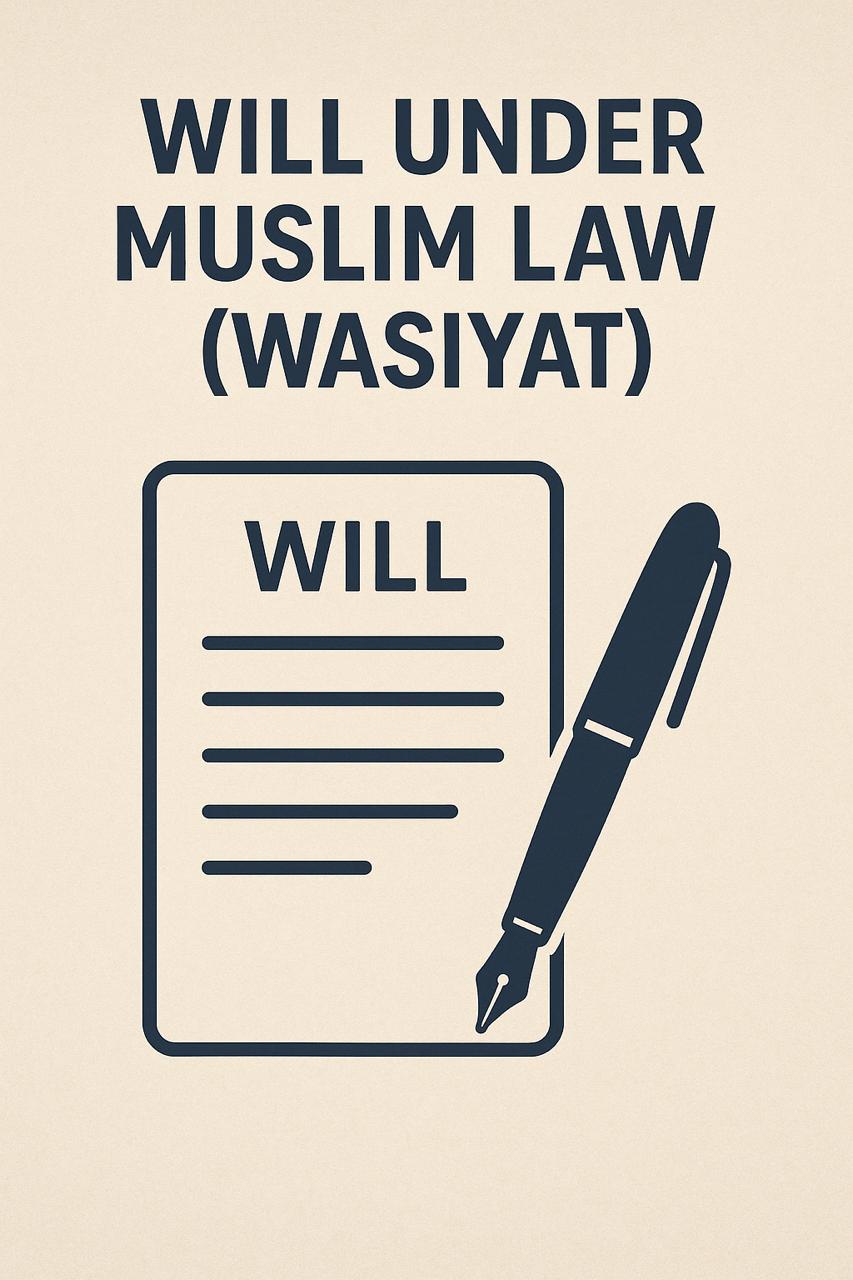 Will under Muslim Law (Wasiyat) – An Analytical Overview
Will under Muslim Law (Wasiyat) – An Analytical Overview
A Muslim may transfer ownership in property in two ways:
1. During lifetime – e.g., gift (hiba)
2. After death – through a will (wasiyat)
✓ A gift takes effect immediately, whereas a will becomes operative only after the death of the testator.
Definition of Will (Wasiyat)
A Will (Wasiyat) signifies the last wish of a person regarding the distribution of their property after death. It is:
• Ambulatory (takes effect after death)
• Revocable (can be changed anytime during life)
Justice Tyabji defines it as “a legal declaration of the intentions of a Muslim regarding his property to be carried into effect after his death.”
✓ No formalities are required. It can be oral or written, with no need for specific words, signature, or attestation.
Important Terms:
• Testator – The person making the will
• Legatee – The person in whose favour the will is made
• Legacy – The subject matter of the will
• Executor – The person appointed to execute the will
Requisites of a Valid Will
1. Testator must be competent
• A Muslim of sound mind and above 18 years
• Age determined by Indian Majority Act
• A will by a minor is invalid unless ratified after attaining majority
• A will obtained by coercion/fraud is invalid
2. Legatee must be competent
• Any person capable of owning property (Muslim or non-Muslim, minor or insane)
• Child in womb can be a legatee (within 6 months – Sunni; within 10 months – Shia)
• Heirs cannot be legatees beyond 1/3 share without consent of other heirs
• Bequest to non-Muslims is valid under all schools in India (due to Act 21 of 1850)
• Manslayer cannot inherit under Hanafi Law (intentional killing – disqualified)
3. Subject of Bequest must be valid
• Must be owned by the testator
• Must be in existence at the time of death
• Bequest of future property is invalid
• Conditional or contingent bequests are void • Bequest must be unconditional
4. Testamentary Limitations
• Only 1/3rd of net assets can be bequeathed without heirs’ consent
• Consent by:
• Sunni Law – After testator’s death
• Shia Law – Before or after death
• If testator has no heirs, full property can be bequeathed
• If married under Special Marriage Act, governed by Indian Succession Act
Example:
Testator’s assets = Rs. 4000
Funeral + debts = Rs. 1000
Net = Rs. 3000 → 1/3rd = Rs. 1000 (can be bequeathed)
Revocation of Will
A Muslim can revoke their will anytime before death, either:
• Expressly (oral, written, tearing or burning the will)
• Impliedly, such as:
• Sale or gift of bequeathed property
• Material change or destruction of property
• Creating a new will of the same property
✓ Mere denial or informal statement doesn’t revoke a will.
Abatement of Legacies (Excess Bequests)
✓ Sunni Law – Rule of Rateable Proportion
• If total bequests > 1/3rd → All reduced proportionately
• Priority to Quranic obligations (faraiz), then wajib, and lastly nawafil
Example:
A: Rs. 30,000
B: Rs. 20,000
Total = Rs. 50,000
Estate = Rs. 75,000 → 1/3rd = Rs. 25,000
A gets Rs. 15,000, B gets Rs. 10,000
✓ Shia Law – Rule of Chronological Priority
• Earlier bequests are honoured first
• Once 1/3rd is exhausted, later legatees get nothing
Example:
A: Rs. 20,000 → gets full
B: Rs. 30,000 → gets Rs. 20,000
C: Rs. 40,000 → gets nothing
(Estate = Rs. 1,20,000 → 1/3rd = Rs. 40,000)
Key Points to Remember
• Will must be made by a major, sane Muslim
• It is valid for 1/3rd property without heirs’ consent
• No formal requirement – can be oral/written
• Can be revoked anytime
• Bequest to heirs beyond 1/3rd needs consent
• Rateable reduction in Sunni Law vs. Chronological Priority in Shia Law
• Religious, charitable institutions can be valid legatees
• If testator dies without heir, entire estate can be disposed via will
Important Case Law
• Husain Begum v. Mohd. Mehdi – Bequest of full property to one heir without consent is void
• Damodar Kashinath Rasane v. Shahzadi Bi – Bequest exceeding 1/3rd is valid only to that extent without heirs’ consent
Conclusion
The concept of Will (Wasiyat) under Muslim law reflects a balance between the individual’s right of disposition and protection of legal heirs. The law ensures that justice prevails through limitations on excessive bequests and provisions for revocation, while also accommodating Islamic values of charity and piety.
Start Your Preparation with TOA
At Theory of Abrogation, we equip you with everything you need:
•Subject-wise expert classes
•Mock test series
•Legal current affairs
•Personalized mentorship for interview preparation
“Your law degree is your foundation, but your preparation is what will build your success.”
Join Our New Batch Now!
Prepare smart. Prepare with Theory of Abrogation.
Contact Us:
📍 B-109, Commercial
Complex Dr. Mukherjee
Nagar, Delhi-09
📞 +91 9971399324 | +91 8840961324
📧[email protected]
